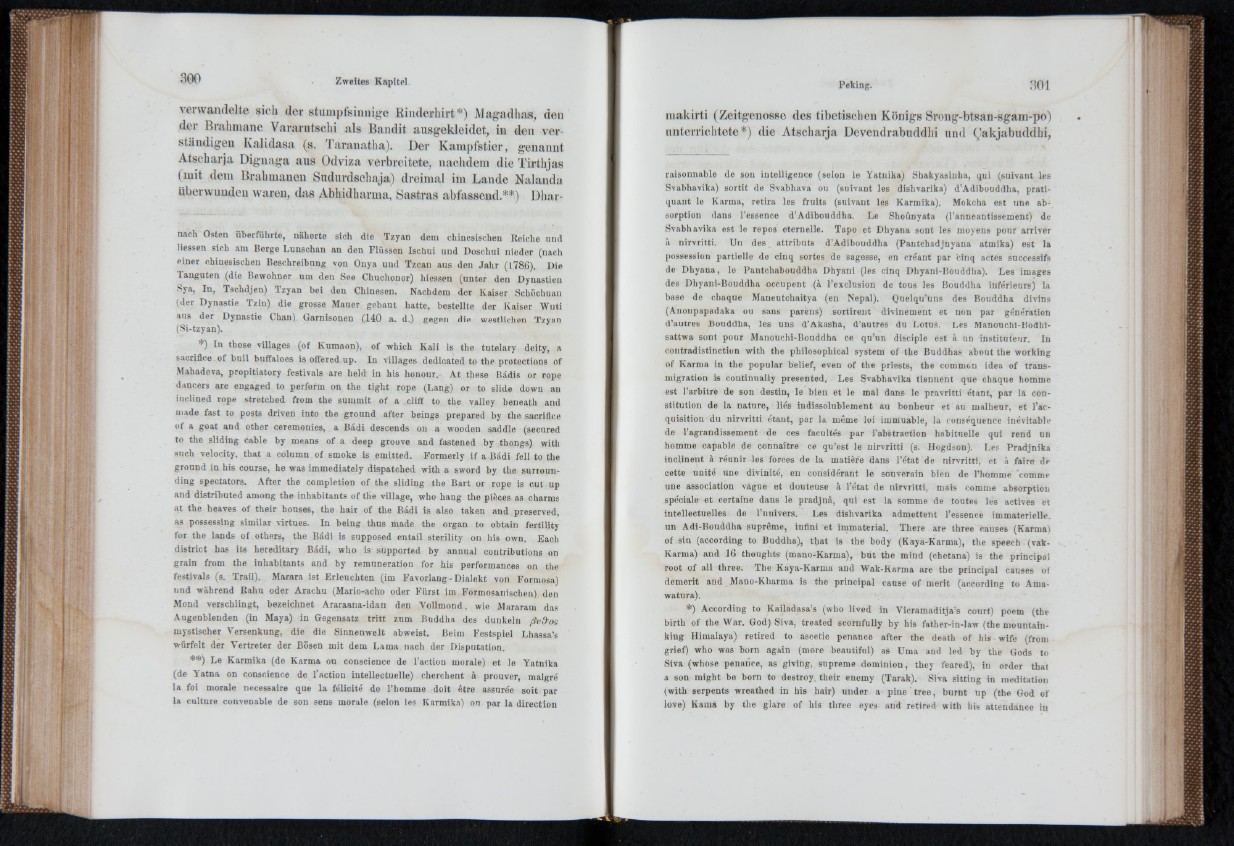
verwandelte sich der stumpfsinnige Rindeshirt*) Magadlias, den
der Brahmane Vararutschi als Bandit ausgekleidet, in den verständigen
Kalidasa (s. Taranatha). Der Kampfstier, genannt
Atscharja Dignaga aus Odviza verbreitete, nachdem die Tirthjas
(mit dem Brakmanen Sudurdschaja) dreimal im Lande Nalanda
überwunden waren, das Abbidharma, Sastras abfassend.**) Dliarnach
Osten überführte, näherte sich die Tzyan dem chinesischen Reiche nnd
Hessen sich am Berge Lunschan an den Flüssen Ischui und Doschui nieder (nach
einer chinesischen Beschreibung von Onya und Tzcan aus den Jah r (1786). Die
Tanguten (die Bewohner um den See Chuchonor) hiessen (unter den Dynastien
Sya, In, Tschdjen) Tzyan bei den Chinesen. Nachdem der Kaiser Schöchuan
(der Dynastie Tzin) die grosse Mauer gebaut hatte, bestellte der Kaiser Wuti
aus der Dynastie Chan) Garnisonen (140 a. d.) gegen die westlichen Tzyan
(Si-tzyan).
’) those villages (of Kumaon), of which Kali is the tutelary deity, a
sacrifice .of bull buffaloes is offered up. In villages dedicated to the protections of
Mahadeva, propitiatory festivals are held in his honour. At these Bédis or rope
dancers are engaged to perform on the tight rope (Lang) or to slide down an
inclined rope stretched from the summit of a cliff to the valley beneath and
made fast to posts driven into the ground after beings prepared by the sacrifice
of a goat and other ceremonies, a Bddi descends on a wooden saddle (secured
to the sliding cable by means of a deep groove and fastened by thongs) with
such velocity, that a column of smoke is emitted. Formerly if a Bédi fell to the
ground in his course, he was immediately dispatched with a sword by the surrounding
spectators. After the completion of the sliding the Bart or rope is cut up
and distributed among the inhabitants of the village, who hang the pièces as charms
at the heaves of their houses, the hair of the Bâdi is also taken and preserved,
as possessing similar virtues. In being thus made the organ to obtain fertility
for the lands of , others, the Bddi is supposed entail sterility on his own. Each
district has its hereditary Badi, who is supported by annual contributions on
grain from the inhabitants and by remuneration for his performances on the
festivals (s. Trail). Marara ist Erleuchten (im Favorlang-Dialekt von Formosa)
und während Rahn oder Arachu (Mario-ach'o oder Fürst im Formosanischen) den
Mond verschlingt, bezeichnet Araraana-idan den Vollmond, wie Mararam das
Augenblenden (in Maya) in Gegensatz tritt zum Buddha des dunkeln ßv&os
mystischer Versenkung, die die Sinnenwelt abweist. Beim Festspiel Lhassa’s
würfelt der Vertreter der Bösen mit dem Lama nach der Disputation.
**) Le Karmika (de Karma ou conscience de l’action morale) et le Yatnika
(de Yatna on conscience de Taction intellectuelle) cherchent à prouver, malgré
la foi morale nécessaire que la félicité de l’homme doit être assurée soit par
la culture convenable de son sens morale (selon les Karmika) on par la direction
makirti (Zeitgenosse des tibetischen Königs Srong-btsan-sgam-po)
unterrichtete*) die Atscharja Devendrabuddhi und (Jakjabuddhi,
raisonnable de son intelligence (selon le Yatnika) Shakyasinha, qui (suivant les
Svabhavika) sortit de Svabhava ou (suivant les dishvarika) d’Adibouddha, pratiquant
le Karma, retira les fruits (suivant les Karmika). Mokcha est une absorption
dans l’essence d’Adibouddha. Le Shoûnyata (l’anneantissement) de
Svabhavika est le repos eternelle. Tapo et Dhyana sont les moyens pour arriver
à nirvritti. Un des attributs d’Adibouddha (Pantchadjnyana atmika) est la
possession partielle de cinq sortes de sagesse, en créant par cinq actes successifs
de Dhyana, le Pantchabouddha Dhyani (les cinq Dhyaui-Bouddha). Les images
des Dhyani-Bouddha occupent (à l’exclusion de tous les Bouddha inférieurs) la
base de chaque Maneutchaitya (en Nepal). Quelqu’une des Bouddha divins
(Anonpapadaka ou sans parens) sortirent divinement et non par génération
d’autres Bouddha, les uns d’Akasha, d’autres du Lotus. Les Manouchi-Bodhi-
sattwa sont pour Manouchi-Bouddha ce qu’un disciple est à un instituteur. In
contradistinction with the philosophical system of the Buddhas about the working
of Karma in the popular belief, even of the priests, the common idea of transmigration
is continually presented. Les Svabhavika tiennent que chaque homme
est l’arbitré de son destin, le bien et le mal dans le pravritti étant, par la constitution
de la nature, liés indissolublement au bonheur et au malheur, et l’acquisition
du nirvritti étant, par la même loi immuable, la conséquence inévitable
de l’agrandissement de ces facultés par l’abstraction habituelle qui rend un
homme capable de connaître ce qu’est le Dirvritti (s. Hogdson). Les Pradjnika
inclinent à réunir les forces de la matière dans l’état de nirvritti, et à faire de
cette unité une divinité, en considérant le souverain bien de l’homme comme
une association vague et douteuse à l’état de nirvritti, mais comme absorption
spéciale et certaine dans le pradjnâ, qui est la somme de toutes les activés et
intellectuelles de l’univers. Les dishvarika admettent l’essence immatérielle,
un Adi-Bouddha suprême, infini et immaterial. There are three causes (Karma)
of sin (according to Buddha), th a t is the body (Kaya-Karma), the speech (vak-
Karma) and 16 thoughts (mano-Karma), bu t the mind (chetana) is the principal
root of all three. The Kaya-Karma and Wak-Karma are the principal causes of
demerit and Mano-Kharma is the principal cause of merit (according to Ama-
watura).
*) According to Kailadasa’s (who lived in Vicramaditja’s court) poem (the
birth of the War. God) Siva, treated scornfully by his father-in-law (the mountain-
king Himalaya) retired to ascetic penance after the death of his wife (from
grief) who was born again (more beautiful) as Uma and led by the Gods to
Siva (whose penance, as giving, supreme dominion, they feared), in order that
a son might be born to destroy, their enemy (Tarak). Siva sitting in meditation
(with serpents wreathed in his hair) under a pine ' tre e , burnt up (the God of
love) Kama by the glare of his three eyes and retired with his attendance iu